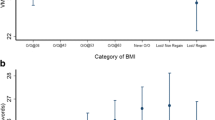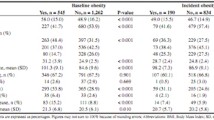Abstract
Objectives
The scientific literature supports a link between midlife adiposity and cognitive function or decline but most studies to-date have investigated only overall adiposity, often omitting important confounders from the analyses. We investigated in a cross-time design the relationships between two different midlife adiposity markers and subsequent cognitive function, testing midlife dietary patterns as a potential confounder of the associations.
Design
The study was based on the «Supplémentation en Vitamines et Minéraux Antioxydants» randomized trial (SU.VI.MAX, 1994–2002) and the SU.VI.MAX 2 observational follow-up study (2007–2009).
Setting
A general-population cohort in France.
Participants
N=2,817 individuals (1,493 men and 1,324 women) included in both the SU.VI.MAX and SU.VI.MAX 2 studies.
Measurements
The cognitive performance of 2,817 middle-aged adults participating in the SU.VI.MAX (Supplémentation en Vitamines et Minéraux Antioxydant) study was assessed in 2007–2009 using 6 neuropsychological tests. Principal component analysis was used to derive specific cognitive scores. A composite cognitive score was also computed. Body mass index (BMI) and waist circumference (WC) were measured 13 years earlier (1994). Associations between midlife adiposity and cognitive functioning were estimated through covariance analyses.
Results
After adjustment for obesity-related cardio-metabolic parameters, higher BMI and larger WC at midlife predicted lower executive function. For example, the adjusted mean difference (95% confidence interval) for 1 SD increase in WC was −0.48 (−0.97, 0.00). Obese participants in midlife showed an adjusted mean difference (95% confidence interval) of −1.68 (−3.15, −0.22) compared with non-obese. Further adjustment for midlife dietary patterns slightly attenuated these associations. No relationships were observed with verbal memory or global cognitive function.
Conclusion
Midlife overall and abdominal adiposity were similarly associated with lower executive functioning scores. Dietary patterns may partly explain such a relationship, arguing for the importance of controlling for lifestyle confounders in future studies.
Article PDF
Similar content being viewed by others
Abbreviations
- BMI:
-
body mass index
- BP:
-
blood pressure
- CES-D:
-
Center for Epidemiologic Studies Depression Scale
- PCA:
-
principal component analysis
- SU.VI.MAX:
-
SUpplémentation en VItamines et Minéraux AntioXydants
- TMT:
-
trail making test
- WC:
-
waist circumference
References
WHO. Global Health Risks. Geneva: WHO Technical Report: 2009.
Elias MF, Goodell AL, Waldstein SR. Obesity, cognitive functioning and dementia: back to the future. J Alzheimers Dis 2012;30 Suppl 2:S113–S125.
Gustafson D. A life course of adiposity and dementia. Eur J Pharmacol 2008 May 6;585(1):163–75.
Beydoun MA, Beydoun HA, Wang Y. Obesity and central obesity as risk factors for incident dementia and its subtypes: a systematic review and meta-analysis. Obes Rev 2008 May;9(3):204–18.
Anstey KJ, Cherbuin N, Budge M, Young J. Body mass index in midlife and late-life as a risk factor for dementia: a meta-analysis of prospective studies. Obes Rev 2011 May;12(5):e426–e437.
Lang PO, Mahmoudi R, Novella JL, Tardieu E, Bertholon LA, Nazeyrollas P, et al. Is obesity a marker of robustness in vulnerable hospitalized aged populations? Prospective, multicenter cohort study of 1 306 acutely ill patients. J Nutr Health Aging 2014 Jan;18(9):66–74.
Batsis JA, Singh S, Lopez-Jimenez F. Anthropometric measurements and survival in older americans: results from the third national health and nutrition examination survey. J Nutr Health Aging 2014;18(2):123–30.
Fitzpatrick S, Gilbert S, Serpell L. Systematic review: are overweight and obese individuals impaired on behavioural tasks of executive functioning? Neuropsychol Rev 2013 Jun;23(2):138–56.
Dahl AK, Hassing LB. Obesity and Cognitive Aging. Epidemiol Rev 2012 Dec 19.
Smith E, Hay P, Campbell L, Trollor JN. A review of the association between obesity and cognitive function across the lifespan: implications for novel approaches to prevention and treatment. Obes Rev 2011 Sep;12(9):740–55.
Sabia S, Kivimaki M, Shipley MJ, Marmot MG, Singh-Manoux A. Body mass index over the adult life course and cognition in late midlife: the Whitehall II Cohort Study. Am J Clin Nutr 2009 Feb;89(2):601–7.
Knopman DS, Mosley TH, Catellier DJ, Coker LH. Fourteen-year longitudinal study of vascular risk factors, APOE genotype, and cognition: the ARIC MRI Study. Alzheimers Dement 2009 May;5(3):207–14.
Wolf PA, Beiser A, Elias MF, Au R, Vasan RS, Seshadri S. Relation of obesity to cognitive function: importance of central obesity and synergistic influence of concomitant hypertension. The Framingham Heart Study. Curr Alzheimer Res 2007 Apr;4(2):111–6.
Hassing LB, Dahl AK, Pedersen NL, Johansson B. Overweight in midlife is related to lower cognitive function 30 years later: a prospective study with longitudinal assessments. Dement Geriatr Cogn Disord 2010;29(6):543–52.
Dahl A, Hassing LB, Fransson E, Berg S, Gatz M, Reynolds CA, et al. Being overweight in midlife is associated with lower cognitive ability and steeper cognitive decline in late life. J Gerontol A Biol Sci Med Sci 2010 Jan;65(1):57–62.
Cournot M, Marquie JC, Ansiau D, Martinaud C, Fonds H, Ferrieres J, et al. Relation between body mass index and cognitive function in healthy middle-aged men and women. Neurology 2006 Oct 10;67(7):1208–14.
Dahl AK, Hassing LB, Fransson EI, Gatz M, Reynolds CA, Pedersen NL. Body mass index across midlife and cognitive change in late life. Int J Obes (Lond) 2013 Feb;37(2):296–302.
Gunstad J, Lhotsky A, Wendell CR, Ferrucci L, Zonderman AB. Longitudinal examination of obesity and cognitive function: results from the Baltimore longitudinal study of aging. Neuroepidemiology 2010;34(4):222–9.
Hercberg S, Galan P, Preziosi P, Roussel AM, Arnaud J, Richard MJ, et al. Background and rationale behind the SU.VI.MAX Study, a prevention trial using nutritional doses of a combination of antioxidant vitamins and minerals to reduce cardiovascular diseases and cancers. SUpplementation en VItamines et Mineraux AntioXydants Study. Int J Vitam Nutr Res 1998;68(1):3–20.
Hercberg S, Galan P, Preziosi P, Bertrais S, Mennen L, Malvy D, et al. The SU.VI.MAX Study: a randomized, placebo-controlled trial of the health effects of antioxidant vitamins and minerals. Arch Intern Med 2004 Nov 22;164(21):2335–42.
Ivanoiu A, Adam S, Van LM, Salmon E, Juillerat AC, Mulligan R, et al. Memory evaluation with a new cued recall test in patients with mild cognitive impairment and Alzheimer’s disease. J Neurol 2005 Jan;252(1):47–55.
Lezak MD, Howieson DB, Loring DW. Neuropsychological Assessment. 4th ed. New York, NY: Oxford University Press; 2004.
Wechsler D. Wechsler Adult Intelligence Scale-Revised. New York, NY: Psychological Corporation: 1981.
Delis DC, Kaplan E, Kramer JH. Delis-Kaplan Executive Function System (DKEFS) examiner’s manual. San Antonio, TX: The Psychological Corporation: 2001.
Radloff L. The CES-DScale: A Self-Report Depression Scale for Research in the General Population. Appl Psychol Meas 1977;1:385–401.
Le Moullec N, Deheeger M, Preziosi P, Montero P, Valeix P, Rolland-Cachera MF, et al. Validation du manuel photos utilisé pour l’enquête alimentaire de l’étude SU.VI.MAX. Cahier de Nutrition et de Diététique 1996;31(3):158–64.
Hercberg S (coordinator). Table de composition SU.VI.MAX des aliments. Paris: Les éditions INSERM/Economica, 182 pages; 2005.
Lean ME, Han TS, Morrison CE. Waist circumference as a measure for indicating need for weight management. BMJ 1995 Jul 15;311(6998):158–61.
Kesse-Guyot E, Amieva H, Castetbon K, Henegar A, Ferry M, Jeandel C, et al. Adherence to nutritional recommendations and subsequent cognitive performance: findings from the prospective Supplementation with Antioxidant Vitamins and Minerals 2 (SU.VI.MAX 2) study. Am J Clin Nutr 2011 Jan;93(1):200–10.
Kesse-Guyot E, Andreeva VA, Jeandel C, Ferry M, Hercberg S, Galan P. A Healthy Dietary Pattern at Midlife Is Associated with Subsequent Cognitive Performance. J Nutr 2012 Mar 28;142(5):909–15.
Coley N, Andrieu S, Gardette V, Gillette-Guyonnet S, Sanz C, Vellas B, et al. Dementia prevention: methodological explanations for inconsistent results. Epidemiol Rev 2008;30:35–66.
Dore GA, Elias MF, Robbins MA, Budge MM, Elias PK. Relation between central adiposity and cognitive function in the Maine-Syracuse Study: attenuation by physical activity. Ann Behav Med 2008 Jun;35(3):341–50.
Gustafson DR. Adiposity and cognitive decline: underlying mechanisms. J Alzheimers Dis 2012;30 Suppl 2:S97–112.
Author information
Authors and Affiliations
Consortia
Corresponding author
Rights and permissions
About this article
Cite this article
Kesse-Guyot, E., Andreeva, V.A., Touvier, M. et al. Overall and abdominal adiposity in midlife and subsequent cognitive function. J Nutr Health Aging 19, 183–189 (2015). https://doi.org/10.1007/s12603-014-0508-2
Received:
Accepted:
Published:
Issue Date:
DOI: https://doi.org/10.1007/s12603-014-0508-2




